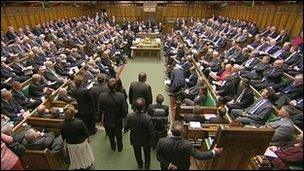Fixed term parliament plans 'open to legal challenge'
- Published

Two thirds of MPs would have to back a dissolution vote
Parts of the government's plans to bring in fixed-term parliaments are vulnerable to legal challenge, the Commons' top official has warned.
Malcolm Jack told MPs the way legislation was worded could "bring the courts and parliament into conflict".
There could be court challenges if the Speaker were to allow an election before the full term was up, he added.
The PM can currently go to the Queen to ask for an election to be held at any time within five years of the last one.
The agreement to have fixed terms was part of the coalition agreement between the Conservatives and Liberal Democrats.
'Highly charged'
But if a government lost the confidence of MPs before the five years was up, the bill contains provisions for parliament to be dissolved.
The Fixed Term Parliaments Bill says an election can be called early, if the government loses a no confidence motion and a new government, which has the confidence of the Commons, cannot be formed within 14 days.
The Speaker would have to certify that those circumstances have been met.
An early election could also be triggered if two thirds of MPs vote to dissolve Parliament.
But in a written submission to the political and constitutional reform committee, Mr Jack - the Clerk of the Commons - said parts of the Bill "impinge upon Parliamentary privilege".
While historically Parliament has the right to rule on its own affairs - via standing orders and the Speaker's rulings - Mr Jack said the Bill meant the Speaker's decision could be challenged in court.
He warned that the Speaker could face "difficult judgements" - for example about what constituted a no confidence motion - in "a potentially highly charged political situation" which could then be open to legal challenge.
Usually the Speaker's word is final but by writing it into legislation, his rulings could ultimately be "determined by the judiciary", Mr Jack wrote.
Issues such as whether the motion had been correctly worded or whether the decision had been correctly reached could be open to challenge.
'Hastily concocted'
He pointed to a case in Germany in 2005 when the Federal Constitutional Court was asked to step in when Gerhard Schroeder decided to call an early election: "The possibility of an election being delayed or cancelled as a result of legal challenge must be an unwelcome one."
Mr Jack said he was not challenging the principle of fixed term parliaments but suggested that the provisions for an early election should be written into the Commons' standing orders - not into legislation.
However committee chairman Graham Allen pointed out that standing orders "are regularly suspended by the government" and could be "altered very rapidly at the whim of, let's say, someone like the chief whip".
Shadow deputy PM Jack Straw said Nick Clegg was presiding over a "constitutional shambles" and needed to go "back to the drawing board".
"The legislation providing for fixed term parliaments has been severely criticised today by the Clerk of the Commons," he said.
"The warped plans for boundary reform, meanwhile, were yesterday exposed by the government's own side as motivated by narrow party advantage."
In an evidence session with the committee, other MPs raised questions about the practicalities of getting two thirds, or 433, of MPs to vote to dissolve Parliament.
Some questioned whether it should be two thirds of total seats, as Sinn Fein MPs do not take their seats in the Commons, some seats may be vacant and MPs are entitled to vote twice both for and against legislation if they want to.
Tory Christopher Chope suggested the bill had been "rushed through", Labour's Tristram Hunt described it as "hastily concocted".
Lib Dem Stephen Williams asked if it was even "physically possible to get 433 members through the doors of the division lobby within eight minutes" - the time MPs have to enter the voting lobby.
"What would happen if the doors were slammed when people were trying to get in?," he asked.
The coalition's original plans for 55% of MPs to be required to trigger a dissolution of Parliament came under fire earlier this year and the threshold was increased to two thirds of MPs.
Two thirds is the threshold used in the Scottish Parliament and Deputy PM Nick Clegg has said it would make it impossible for any government to "force a dissolution for its own purposes".
But the existing threshold for a no-confidence vote would remain as a simple majority of 50% plus one.
David Cameron has said he is the first prime minister to agree to give up power over setting the election date and says the move will give Parliament added powers.